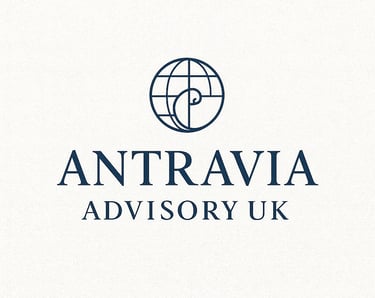How to Open a Company in the UK: A Step-by-Step Guide for Businesses
Learn how to open a company in the UK. This guide explains the registration process, costs, taxes, and accounting steps for travel and hospitality businesses.
TRAVEL FINANCE AND ACCOUNTING BLOG - U.K. FOCUS
10/31/20255 min read


How to Open a Company in the UK: A Step-by-Step Guide for Travel and Hospitality Businesses
Meta title:
How to Open a Limited Company in the UK | Travel & Hospitality Finance Guide | Antravia UK
Meta description:
Learn how to open a company in the UK. This guide explains the registration process, costs, taxes, and accounting steps for travel and hospitality businesses.
Why Incorporation Matters for UK Travel and Hospitality Businesses
Many travel agents and small hotel owners in the UK begin as sole traders. It’s simple to start that way, but as soon as bookings grow, risks grow too — from supplier contracts and client refunds to tax exposure. Forming a limited company isn’t just a legal formality; it’s the foundation for financial protection, professional credibility, and cleaner accounting.
At Antravia UK, we work with travel and hospitality businesses across England, Scotland, Wales, and Northern Ireland to help them set up correctly from day one. Here’s what you need to know.
Step 1: Decide on Your Company Structure
In the UK, most small travel and hospitality businesses choose between sole trader, partnership, or limited company.
A sole trader operates under one person’s name and pays income tax on profits through Self Assessment. It’s easy to run but offers no liability protection.
A partnership spreads income and responsibility across two or more owners, but partners remain personally liable for debts unless it’s a limited liability partnership (LLP).
A limited company is a separate legal entity. It protects your personal assets, gives you access to corporate banking and credit, and adds credibility when working with suppliers, investors, or OTAs. Most established travel businesses use this model.
Step 2: Choose and Register Your Company Name
Your company name must be unique and compliant with Companies House rules.
Check availability using the Companies House name search.
Avoid restricted words such as “British,” “Authority,” or “Government” unless you have approval.
You can use “Limited” or “Ltd” at the end of your name, or “Cymru”/“Cyf” in Wales.
If you plan to use a trading name (for example, “Antravia Travel Consultancy” instead of your legal name), you can register a ‘trading as’ (T/A) name, but your official documents must still show the registered company name.
Step 3: Register with Companies House
You can register your company online at GOV.UK – Register a Company. The process takes about 10 to 15 minutes, and the standard fee is £12. Paper filings cost £40.
You’ll need:
A company name.
A UK registered office address (can be your accountant’s).
Details of at least one director and one shareholder.
A statement of capital (how many shares you issue).
Your SIC code, which describes your business activity (for example, “79110 – Travel agency activities” or “55100 – Hotels and similar accommodation”).
When approved, you’ll receive your Certificate of Incorporation, confirming your company legally exists.
Step 4: Register for Corporation Tax and VAT
Within three months of starting business activity, you must register for Corporation Tax with HMRC. This can be done directly through your new Companies House account.
If your annual taxable turnover exceeds £90,000 (as of 2025), you must also register for VAT. Many travel agencies fall under the Tour Operators Margin Scheme (TOMS), which has specific rules about how VAT is calculated on travel packages.
Even if you’re below the threshold, voluntary registration can help reclaim VAT on expenses and improve supplier credibility.
Step 5: Open a Business Bank Account
Once your company is formed, open a dedicated business bank account in the company’s name. This keeps your accounts compliant and makes reconciliation easier.
Most UK banks — such as Barclays, Lloyds, HSBC, NatWest, and Revolut Business — offer startup accounts for limited companies. You’ll need:
Your Certificate of Incorporation.
Proof of identity for directors.
Your company’s registered address.
Never use a personal account for business transactions; it breaks the legal separation between you and the company.
Step 6: Set Up Accounting and Bookkeeping Systems
Travel and hospitality accounting can be complex because of deposits, supplier prepayments, and multi-currency payments. Setting up proper systems from the start prevents costly mistakes later.
Software such as Xero, QuickBooks Online, or FreeAgent integrates easily with bank feeds and travel booking systems.
Your company will need to maintain:
A chart of accounts showing income, commissions, and cost of sales.
Monthly reconciliations of client and supplier payments.
Annual accounts prepared under UK GAAP or FRS 105 for micro-entities.
Antravia UK can help you design your accounting system so it aligns with industry standards such as TOMS VAT and IATA reporting.
Step 7: Understand Your Tax and Filing Duties
Every UK company must file:
Company tax return (CT600) annually with HMRC.
Statutory accounts with Companies House.
Confirmation statement (usually £13 per year).
Directors also file a Self Assessment tax return if they receive dividends or a salary. Corporation Tax is currently 25% for profits over £250,000, with a marginal rate for smaller companies.
If you pay yourself through a salary, you must register for PAYE (Pay As You Earn) and submit payroll each month.
Step 8: Register with Sector Regulators (If Applicable)
If your company sells or arranges travel, you may need additional registrations:
ATOL (Air Travel Organiser’s Licence) if you sell flight-inclusive packages.
ABTA membership for package protection.
ICO registration if you handle client data.
Hotels and B&Bs must comply with Fire Safety and Health and Safety at Work regulations, and may require local council approval for food service or alcohol licensing.
Step 9: Keep Your Company in Good Standing
Each year, file your accounts and pay your Corporation Tax within nine months of the year end. File your confirmation statement annually, and keep director and shareholder details up to date with Companies House.
Maintain proper records for at least six years, including invoices, receipts, payroll, and VAT returns. Late filings can result in automatic penalties and loss of good standing.
Step 10: Build for Growth
Once your company is established, structure it for the future. You can add additional shareholders, bring in investors, or create a holding company for group travel ventures. A clean accounting record makes future financing, credit, or even sale of the business much easier.
Final Thoughts
Setting up a limited company in the UK is fast and affordable, but doing it correctly ensures long-term compliance and credibility. For most travel and hospitality professionals, it’s the natural next step after proving demand and earning steady revenue.
At Antravia UK, we guide travel businesses through every stage — from incorporation and VAT setup to ongoing accounting and financial planning.
👉 Contact Antravia UK to learn how to structure your company for sustainable growth.


References
GOV.UK – Register a Company: https://www.gov.uk/register-a-company
Companies House – Company Name Rules: https://www.gov.uk/government/publications/incorporation-and-names/incorporation-and-names
HMRC – Corporation Tax Registration: https://www.gov.uk/limited-company-formation/set-up-your-company-for-corporation-tax
HMRC – VAT Registration: https://www.gov.uk/vat-registration
HMRC – Tour Operators Margin Scheme (TOMS): https://www.gov.uk/guidance/vat-margin-schemes-tour-operators
Civil Aviation Authority – ATOL: https://www.caa.co.uk/atol-protection
ABTA – Membership: https://www.abta.com/join-abta


Disclaimer
This article is provided for general information purposes only and does not constitute accounting, tax, or legal advice. Regulations, tax rules, and reporting requirements may change, and their application can vary depending on your business structure and circumstances. Readers should seek professional guidance from a qualified accountant or adviser before making any financial, tax, or compliance decisions. Antravia UK accepts no responsibility for any loss arising from reliance on the information contained herein.
Antravia Advisory UK
Where Travel Meets Smart Finance
Email:
Contact us:
© 2025. All rights reserved. | Disclaimer | Privacy Policy | Terms of Use | Accessibility Statement
© 2025 Part of the Antravia Group.
Antravia.com | Antravia.co.uk | Antravia.ae |
Finance.travel | Tax.travel | Consultancy.travel | VAT.travel | VAT.claims |
USSales.tax | EuroVAT.tax | UKVAT.tax |
contact@antravia.com
Antravia Ltd
71-75 Shelton Street
Covent Garden, London
WC2H 9JQ
United Kingdom
